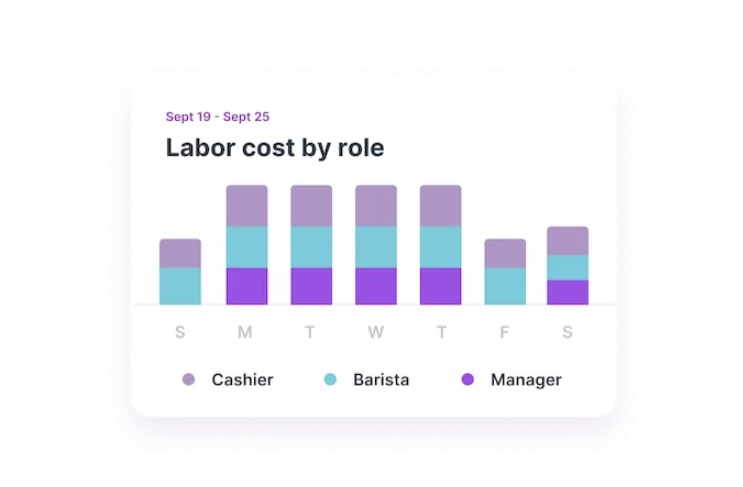All small business owners know the importance of paying people fairly and staying competitive in the labor market. Complying with minimum wage regulations is important for your team — but it’s also your legal responsibility. Failing to follow Illinois’ minimum wage laws means risking penalties, lawsuits, and damage to your reputation.
Yet keeping up with changing state, city, and county minimums in Illinois can feel like a full-time job. Should you budget for $13 per hour paychecks? $14? How will rising labor costs impact your slim margins and operations?
This guide will help you answer these questions and more. This guide breaks down Illinois’s minimum wage laws in clear, simple terms. You’ll learn the baseline pay rates, upcoming increases, and how to comply and stay within budget, taking into account overtime and other factors.
Illinois minimum wage explained
The Illinois minimum wage is higher than the federal minimum (currently $7.25 per hour, in 2023). Plus, different localities like Chicago and Cook County have passed even higher local minimums.
That makes it even more important for Illinois businesses to plan for labor costs and make sure they’re paying their people correctly.
Current minimum wage in Illinois
Right now, and since January 1, 2023, the Illinois minimum wage is $13 per hour for non-tipped, adult workers.
There are some important exceptions to this minimum pay rate.
For example, workers under 18 who work less than 650 hours per calendar year can legally be paid less than the full Illinois minimum wage. In 2023, their minimum is $10.50 per hour. However, staff under 18 years of age who work 650+ hours per year must be paid the standard $13 per hour minimum.
In some cases, employers can apply for a special waiver to pay a lower wage to certain workers with disabilities.
Illinois labor laws are also slightly different for tipped workers — employees who regularly earn gratuities, such as bartenders, waitstaff, or salon workers.
Essentially, businesses can pay tipped workers less than minimum wage as long as they make up the difference in tips. This is called a tip credit.
Illinois allows employers can pay staff a tip credit up to 40% of minimum wage. That means they can pay tipped employees just 60% of the current minimum wage, which works out at $7.80 per hour.
At the end of the pay period, if the staff member’s tips plus cash wages do not equal at least the full $13 minimum wage per hour, the employer must make up the shortfall.
Local minimum wage in Illinois
On top of state law, some localities in Illinois mandate higher minimum wages.
As of July 1, 2023, Chicago’s current minimum wage is:
- Non-tipped workers —
- $15.80 per hour (if the business has 21+ employees)
- $15 per hour (if the business has 4-20 employees)
- Tipped workers —
- $9.48 per hour (if the business has 21+ employees)
- $9 per hour (if the business has 4-20 employees)
As of 1 July, 2023, the minimum wage in Cook County (excluding Chicago) is:
- Non-tipped workers — $13.70 per hour
- Tipped workers — $8 per hour
If you have a storefront or other business in Chicago or Cook County, these local minimums apply rather than the state $13 rate.
Upcoming minimum wage changes
Illinois’ statewide minimum wage is set to continue rising yearly through 2025.
On January 1, 2024, it will rise to $14 per hour for non-tipped workers and $8.40 per hour for tipped employees.
Then, on January 1, 2025, it’s scheduled to increase to $15 hourly for non-tipped employees and $9 for tipped.
Chicago and Cook County also have planned increases coming up in July. The exact amounts haven’t been confirmed yet, but the rise will be based on inflation using the Consumer Price Index (CPI) — unless the CPI is above 2.5%, in which case they will apply a 2.5% minimum wage increase cap.
It’s also important to be aware that Chicago recently brought in new legislation to phase out tip credits by 2028, meaning that businesses will have to start paying tipped workers the same minimum wage as non-tipped workers in the future.
On July 1, 2024, the permitted tip credit in Chicago will shrink from 40% to 32%: employers will have to pay tipped staff at least 68% of the minimum wage. The tip credit will continue shrinking each year until 2028, when it will be eliminated altogether.
Preparing for minimum wage increases
Since minimum wage is rising steadily in Illinois, preparation is key for small business owners on a tight budget.
Here are five tips for taking a strategic approach to the minimum wage changes.
1. Review your employee pay rates before the increase
First, make sure you’re not currently paying any staff below the current 2023 minimum wage; if you are, you’ll need to increase pay immediately and possibly organize back payments.
Employees currently paid the $13 per hour minimum will likely need to be paid an hourly rate of $14 from January 1, 2024 — more if you’re based in Chicago or Cook Country. It’s a good idea to check all employee pay rates in advance so you know exactly where increases are needed.

2. Create a budget forecast
Map out your labor costs for 2024, and possibly even 2025.
In your forecast, apply Illinois’ scheduled increases to estimate your overall employee costs and see how much to expect your payroll spending to rise each January.
You’ll be able to see if this will create a budget shortfall and plan accordingly.
3. Consider changes to costs or prices
See whether you can trim costs elsewhere or raise prices to absorb rising labor expenses.
Operational adjustments for a local pizzeria could include:
- Switching to part-time staff to reduce hourly costs
- Address pricy employee scheduling issues, like having more staff than you need working during non-peak hours
- Increasing the delivery fee by $1 to pass some costs to customers
- Buying cheese in bulk from restaurant supply vendors to save on ingredients
- Offering smaller portion sizes for more price-conscious customers
4. Focus on hiring and retaining great people
Be selective when hiring. Only contract candidates you feel confident will deliver an excellent return on your investment in their salary and training. For service roles especially, hire for soft skills as well as technical experience to make sure your people provide a great customer experience.
Employee turnover and attrition come with significant hiring and training costs.
Use proven employee retention strategies like offering competitive pay, providing opportunities for professional development and promotion, giving perks like early access to paychecks and flexible scheduling, and creating a great work environment.
5. Cut down any unnecessary overtime spend
Under Illinois law, you generally have to pay non-exempt employees 1.5 times their regular hourly rate for any hours they work over a 40-hour week.
At $13 per hour, that means the overtime rate is $19.50 per hour in most of Illinois (even more in Chicago and Cook County). But this will soon rise to $21 per hour when the minimum hits $14 next January.
Some overtime is unavoidable, but you can get smart about scheduling extra hours only when they’re absolutely necessary. Maybe a flower shop needs all hands on deck the week before Valentine’s day, but can limit or eliminate overtime during slower periods.
Homebase’s time clock and tracking tools can alert you when an employee is approaching the overtime limit, so you can decide whether the extra hours are needed.
Use Homebase to plan for pay changes with ease
Homebase empowers small businesses to adapt to changing minimum wage laws.
Our easy-to-use tools automate payroll based on your state, so you can be sure you’re complying with minimum wage regulations, paying your people correctly, and keeping detailed records.
You can track hours and overtime automatically with Homebase time clocks — and timesheets are synced to payroll so you don’t need to do the calculations.
By using our HR and compliance features, you can get notified when labor laws change in your state (or at a federal level) and ask an HR pro if you have doubts about minimum wage or anything else.
Homebase can also streamline your hiring process, so you feel confident you’re hiring the right people and saving labor costs in the long run.
With all of this, plus effective scheduling and communication tools, Homebase is the perfect partner for small companies looking to spend less time on paperwork and more time on growing their business.
FAQs about Illinois minimum wage
Are there any exceptions to the Illinois minimum wage?
Yes, there are several exceptions to the Illinois minimum wage. Here are the key exception cases:
Tipped employees: An employer may pay 60% of the Illinois minimum wage 2023 ($7.80 per hour) to employees who regularly receive gratuities, as long as tips make up the difference.
Under 18s: Employees who are 17 years old or younger and work less than 650 hours in a calendar year may be paid at the rate of $10.50 per hour.
Sub-minimum rates: In some cases, employers can apply for special licenses to pay sub-minimum rates to learners and certain workers with physical and mental limitations.
What is the minimum wage in Chicago, Illinois?
As of July 1, 2023, the minimum wage in Chicago is $15.80 per hour for employers with 21 or more workers, and $15.00 per hour for employers with 4–20 workers. Tipped workers have a minimum wage of either $9.00 (small employers) or $9.48 (large employers). If a tipped worker’s wages plus tips do not equal at least the full minimum wage, the employer must make up the difference.
How does the minimum wage in Cook County, Illinois compare with the rest of Illinois?
As of July 1, 2023, the minimum wage in Cook County, Illinois is $13.70 for non-tipped workers and $8.00 for tipped employees.
Compared with the state minimum wage of $13.00 per hour for non-tipped workers and $7.80 for tipped workers, Cook County’s minimum pay is higher. However, it’s lower than the minimum wage in Chicago, which is $15 or $15.80 for non-tipped employees and $9 or $9.48 for tipped employees.
